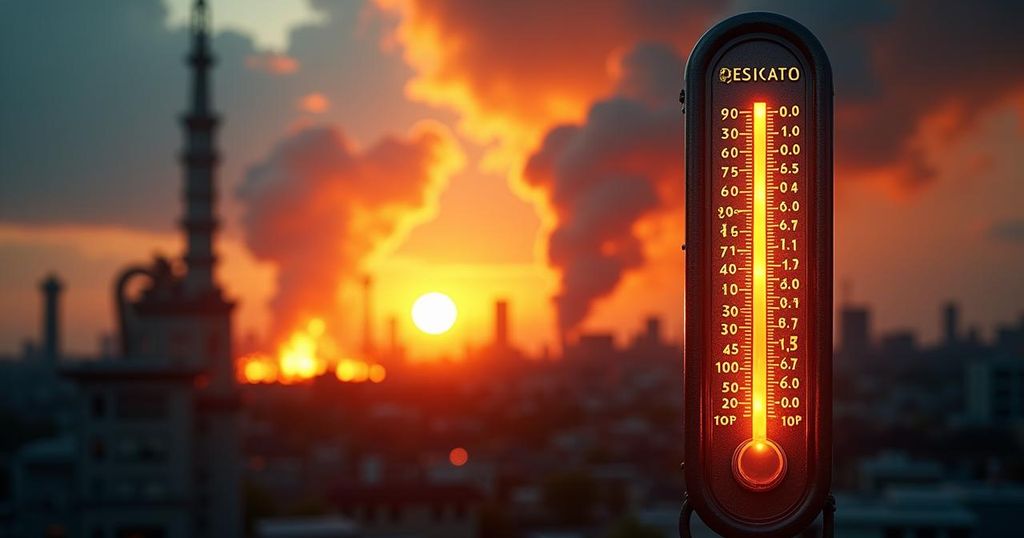The world’s climate situation remains dire, with a potential rise of 2.7°C expected this century if significant action is not taken. The report reveals a concerning increase in greenhouse gas emissions, especially from fossil fuels, despite the growth of renewables. Immediate measures, including a global carbon price and enhanced focus on climate justice, are urgently required to avert catastrophic consequences of climate change.
The global climate crisis has reached an unprecedented level of urgency, with the world on a trajectory towards a potential 2.7°C rise in temperatures by the end of the century, substantially exceeding the Paris Agreement target of limiting this increase to 1.5°C. Recent evidence highlights the alarming frequency of extreme weather events exacerbated by climate change, including severe tropical storms such as Hurricane Helene and Super Typhoon Yagi, catastrophic wildfires in Canada, and significant drought affecting regions like Brazil. The year 2023 has already been marked as nearly the hottest on record, with global temperatures significantly rising. This alarming trend is documented in the 2024 State of the Climate report, which indicates that 25 of the 35 vital signs of the planet are at record levels, predominantly pointing towards a detrimental path. Despite the rapid growth of renewable energy sources, fossil fuel consumption has continued to rise, contributing to unprecedented emissions of greenhouse gases. In September, atmospheric carbon dioxide concentrations reached 422 parts per million, underscoring the dire state of global emissions and the urgent need for action. Moreover, the upcoming United Nations climate negotiations in Azerbaijan, COP 29, will present an essential opportunity for world leaders to reassess their climate strategies. Without more stringent measures, the repercussions of climate change, including increased frequency of severe weather events, will only worsen. The report stresses the necessity for an immediate cessation of fossil fuel dependency and advocates for policies such as a robust global carbon price to reduce emissions, particularly from affluent nations. Additionally, there is a pressing need to address methane emissions, which are significantly more potent than CO2 but have a shorter atmospheric lifespan. Implementing natural climate solutions, such as reforestation and improved forest management, is essential to enhance carbon absorption. Furthermore, climate justice must be prioritized; nations with minimal contributions to global emissions often suffer the most severe impacts. Therefore, wealthier countries are urged to extend financial and technical assistance to vulnerable nations, aiding their transition to renewable energy sources and enhancing their resilience to climate disasters. Without immediate and substantive changes, the world faces dire consequences of climate change, with current trajectories predicting a 2.7°C rise. A global commitment to aggressive emission reductions, a transition to renewable energy, and a focus on climate justice is paramount to avert potential catastrophes.
The persistence of climate change exemplifies a profound global challenge, manifesting in extreme weather patterns, rising sea levels, and ecological degradation. Climate change primarily results from increased greenhouse gas emissions, chiefly due to the reliance on fossil fuels. Despite numerous international agreements aimed at curtailing these emissions, significant challenges persist in transitioning to sustainable energy sources. The goal under the Paris Agreement to limit global warming to 1.5°C is increasingly at risk, as recent data illustrates a dangerous upward trend in global temperatures and climate instability.
In conclusion, the article elucidates the critical state of the global climate crisis, emphasizing the urgent need for action to limit temperatures from rising beyond 2.7°C this century. It highlights the catastrophic impacts of climate change already being felt worldwide. Immediate and transformative policy changes are required to decrease fossil fuel use, enhance renewable energy adoption, and address climate justice issues to mitigate the worst possible outcomes for future generations.
Original Source: theconversation.com






